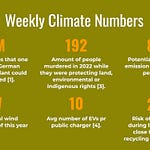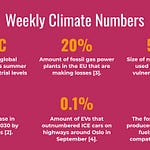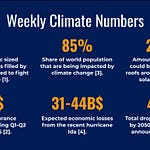Welcome to this weeks edition of The Weekly Climate 🎉
References: [1], [2], [3], [4], [5] and [6].
For those listening on the newsletter or the podcast you will notice that there’s not a lot of sound effects this time. Perhaps that for the better? But in any case the reason is that I’ve grown tired of fighting with my former podcast app and are getting used to a new one. So I will probably augment the podcast format in the coming weeks.
Finally, remember that it’s not too late to sign up for our Massive.earth Challenge. Come join us and find your climate project!
‼️News you can’t miss
Here’s one important scary/bad (🙀), good (😻), interesting (😼) and fossil (💩) news item.
🙀 Be careful if you try to buy an F-gas free fridge, you may still get one that contains F-gases.
😻 YoY increase in wind capacity installed was 59% in 2020
😼 A look at the roadmap for virtual power plants and what’s needed for this technology to truly make a difference.
💩 Big “green” PR firm Edelman caught with its pants down for taking fossil fuel money
👩⚕️ Status: Climate & Science
Let’s look at how we’re doing this week!
[#amazon] — Recent studies have concluded that the Amazon is on the brink of becoming a carbon source, and not a sink. New studies conclude that some parts of the Amazon are already emitting more CO2 than they sequester. The forest is damaged by deforestation and rising temperature is causing this effect.
[#covid] — A climate scientist looks back at the year of COVID and what we learned from the pandemic. It’s summed up by three things: Climate science can operate in close to real-time, COVID didn’t do anything to delay climate change and finally, that we’re still very far from doing enough
[#tropics] — A new study released last week claims that we need to cut temperature increases now if people want to continue to live in the tropics. The study concludes that a temperature increase above 1.5C will increase the risk of so called extreme wet-bulb temperatures that go well beyond the limits for human survival.
📰 The 7 Grand Challenges
⚡️Decarbonize Electricity
Clean electricity is the one do-or-die challenge we must solve.
[#nuclear] — A sobering and balanced view (compared to many other articles I’ve read this week about this) on the 10 year anniversary of the Fukushima accident. It looks inward at the US nuclear power industry and argues that nuclear’s biggest problem is cost and that must come down if nuclear is to play a role in the climate crisis. At the same time known heads of big tech such as Bill Gates is a strong proponent of nuclear saying that nuclear has to be part of the mix.
[#energystorage] — One problem for deploying renewable energy globally is the amount of space it takes if one has to take country borders into account. Some countries simply don’t have the space for the generators and storage. A company is developing floating energy storage to solve that problem.
[#extremeweather] — A problem to keep an eye on. According to an insurer: 70% of all solar-related financial losses due to extreme weather has happened since 2017. Extreme weather is not very nice to most kinds of renewables. For instance solar installations have a big problem with hailstorms and wildfires.
[#wind] — Despite the pandemic global wind installations grew more than 100GW. That’s a 59% YoY increase. This other article claims that 100GW was installed in China last year. Which is more than was added in the entire world in 2019. Numbers are bit conflicting in the two articles but it sure is a lot of wind!
🏘 Reduce impact of urban and rural areas
Lowering the impact of urban and rural areas.
[#fashion] — The fashion industry has a fossil fuel problem. 60% of all clothes produced today uses fibers derived from fossil fuel products such as plastic. If this doesn’t stop then projections say that 20% of fossil fuel consumption in 2050 will be due to these plastic type fibers.
🛁 Clean non-electrifiable activities
Some activities we do today can’t be electrified, these must be cleaned some other way.
[#plastic] — The world and in particular, the US keep on sending plastic waste to developing countries, because no other countries will accept it. Out of sight, out of mind right? Disgusting.
[#f-gas] — If you have an old fridge it’s very likely that it is using some kind of F-gases as coolant. F-gases are extremely potent greenhouse gases. Although most fridges only contain a few 100grams of these, releasing them into the atmosphere would be the same as lighting a barrel of oil on fire. This reporter from Inside Climate News went and tried to purchase an F-gas free fridge and despite his best efforts he ended up with one containing F-gases. If you’re wondering whether your fridge contains F-gases check this article to see how you can figure out which coolant is used.
[#biofuels] — Policies in the EU and other places includes a lot of support for biofuels. The problem with that though is that it will increase deforestation, massively, according to this newly released study. Biofuel demand which is expected to be largely driven by the aviation industry is expected to increase the demand for palm and soy oil by up to 90% by 2030. Hence leading to a lot of deforestation.
[#shipping] — A look at methanol as an option for cleaning up ship transport. There’s a couple of issues with methanol one of them being that like hydrogen it needs to be produced without the use of fossil fuels, which at this point is expensive. And the worlds supply of bio- or e-methanol (the clean kind) is very small currently. The benefit of methanol is that it’s easy to store and can be used as a drop-in placement for fossil fuels.
🌳 Protect and grow nature
Nature is our ally, we must protect it and help it help us.
[#indigenous] — An often overlooked solution to conserving nature is to get help from the people that have been doing it for ages: The indigenous people. This article looks into how. This other article looks into how indigenous people are using newer technology such as drones to protect their lands from deforestation.
[#landuse] — A new study has found that land in many places is more valuable if left to nature than when farmed. 😳 This put an even bigger question mark in front of why our agricultural sector works the way it does today. Not only is it responsible for 1/3 of our emissions but it’s not even creating more value out of those emissions. What?!
[#wildfires] — Forests are increasingly not coming back after being devastated by wildfires. This used to the case but not anymore. The leading cause is the combined effect of climate change with the fires. The study indicates that by 2050, 15% forests felled by wildfires would not return.
🍽 Optimize food
Without the lower impact of food or drink the hero doesn’t work (modified old danish proverb).
[#regenerative] — You know when startup news sites like Techcrunch posts an article about regenerative agriculture, that the startup hype is about to come to this area. But sure it is a really exciting field.
[#emissions] — A new report has calculated that the food systems of the world was responsible for 34% of human emissions in 2015 (the data studied). The study was released in relation to the unveiling of the database EDGAR-FOOD which covers emissions of all parts of the food value chain between 1990 and 2015. Anybody working in the food space should probably make bookmark of that database.
[#learning] — Startup, Wefarm, raises an 11M$ Series B round to expand it’s platform helping smallholder farmers learn from each other. It currently has 2.5 million users. It’s estimated that there are more than 400 million smallholder farmers worldwide.
⚖️ Climate Justice
Without justice there’s no future.
[#flaring] — A new study from University of California determines that close to 500K Americans live within close proximity of a fossil fuel operation, which makes them susceptible to increased health risks due to flaring.
⬇️ Engineered drawdown and geoengineering
Protecting our planet and species one way or another
[#pointsource] — A huge carbon capture and storage project led by BP will in the UK suck carbon dioxide from the smokestacks of a number of fossil fuel plants and inject it into the ground. As you probably know this technique has a couple of math problems. One of them is cost, the other is the size of the CO2 molecules. This article has the details about this major point-source project.
📦 Other / catch-all
All the other stuff that I couldn’t fit into any of the other categories, than the other category.
[#media] — 380 minutes. That’s how much air time climate change got on US media in 2020. 0.4% of total air time. While obviously not enough, it’s really impressive how big climate change has seemed to become in the US despite this very poor standard from major news outlets in the country. I wonder how the numbers look here in the EU and other places.
[#book] — Naomi Klein (climate activist, capitalism-hater and author of “This changes everything” and many more) has released a new book called “How to change everything” and is self-proclaimed “ammo for activists”. Sounds interesting.
⭐️Special Topics
🎩 Global and local policy
We have a special interest in covering the major global and local policies regarding climate, whether good or bad.
[#OECD] — Climate experts have expressed deep discontent over the choice of Mathias Cormann as the new head of OECD. Mathias used to be the finance minister of Australia, you know, one of the only developed countries who appear to have no intention of doing anything to help solve the climate crisis.
[#covid] — Despite lofty and countless words from politicians world wide we are not using the opportunity left over by the COVID crisis to build back greener. Only 2.5% of government spending are going towards green intiatives.
[#bordertax] — The EU has voted for the introduction of a carbon border tax that will tax goods imported from countries that doesn’t have a carbon tax. This is sounds really great!
[#china] — China has approved it’s 14th 5 year plan which outlines the countries goals for the period 2021 to 2025. As hoped the plan does contain commitments to reduce energy intensity by 13.5% and CO2 emissions by 18%. This article by CarbonBrief dives deep into what this means.
⛽️Major Carbon Emitters
We have a special interest in covering the moving of the major carbon emitters as these are the key roadblock to climate action.
[#fracking] — The fossil fuel industry in the US has claimed for years that the “fracking boom” (which is now more and more turning in to a bust) has created a lot of jobs. The only problem is that a new report has found the economic benefits for areas that have been fracking to be minimal if any at all.
[#pr] — Edelman, a PR company in the US who promotes itself on it’s green credentials have been caught with it’s pants down having taken 4M$ from a fossil fuel industry trade group that even Shell and BP is not a part of due to the groups aggressive stance on climate solutions. Appalling. We need to drag companies like this down with the fossil fuel industry.
[#strandedassets] — A think tank co-founded by Tony Seba, the Stanford University futurist who’s credited with correctly predicting the rapid fall in cost of renewable energy, concluded that the amount of stranded assets in the fossil fuel sector will be more than 1trillion $ in 2030. Hence he argues that fossil fuel assets are already today highly over-valued. It’s pretty scare to think about that most people’s pension funds are locked away in these companies.
[#startups] — Shell has announced three startups to join it’s accelerator program. Hmm.. If you haven’t heard the story about the Attwaters Prairie Chicken it’s pretty interesting and related (source is Naomi Kleins book, “This changes everything”). Basically, an NGO heroically bought land to save one of the few remaining areas where this bird was still living from fossil gas extraction. Problem was just that the NGO later was caught drilling for gas itself in the same area. Why? Short answer: They took dirty money. So I don’t know. If you’re a startup. I would really think long and hard about who you, in lack of better way, lay in bed with... There’s no historic evidence that the fossil fuel industry is out to help. There’s plenty of evidence pointing the other way though. And history is littered with scandals from companies that took dirty money. It’s also worrying to me that a startup new site like Techcrunch picks it up and doesn’t even reflect on this. If anybody knows one of these startups I would love to learn why decided to join an acceleration program like this.
[#propaganda] — A new report that the Republicans uses to trash Biden’s climate plan comes from ... guess who.. the fossil fuel industry.
[#keepitintheground] — A great opinion piece on how we must stop fossil fuels. The author highlights the recent ban and phase-out of ozone depleting gases. Back then we could have decided to go with a carbon tax, but we didn’t because we needed to act fast. Now we’re in the same situation.
[#bitcoin] — When you look at Bitcoins carbon footprint, 1 Bitcoin transaction corresponds to more than 700.000 VISA transactions or watching 55.000 hours of Youtube videos. So anybody telling you that the “old economy” also pollutes is right, but it appears that it’s not even close in terms of scale. Let me be clear, that it’s Bitcoin and the other cryptos that uses the same proof-of-work type algorithms that’s the problem here. Not blockchain in general.
That’s it for this week folks! Remember if you’re feeling down, angry or sad from some of the news in this newsletter one cure is to act. And one way you can always act that also happens to be one of the most powerful things you can do is to talk about it. That also works if what you just read made you hopeful or happy btw.
If you enjoyed this newsletter don’t forget to share it with your friends, coworkers or other people you think could benefit from getting it. If you got directed here by a friend or another link on the Internet don’t forget to subscribe!
See you all next week 👋












